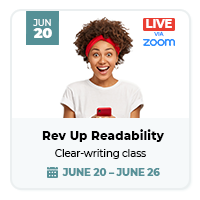The higher your score, the easier your message is to read
In 1946, lawyer, author and writing consultant Rudolph Flesch “started a revolution in journalism and business communication.” That’s when Flesch published a readability formula in his dissertation, “Marks of a Readable Style.”

That formula, the Flesch Reading Ease index, was the original Flesch test. The formula is:
206.835 – (1.015 x words per sentence)
– (84.6 x syllables per word)
= reading ease
(It might seem weird that a lawyer would support readability. But lawyers like to win, and to win, they need to write understandable arguments. Flesch is not the only lawyer to lead readability efforts. In 1979, for instance, attorney Robert Charrow worked with linguist Veda Charrow to improve readability in jury instructions. More recently, Joseph Kimble has chronicled case studies of organizations that have boosted ROI by improving readability.)
Flesch’s work with the Associated Press helped bring the reading level of front-page newspaper stories down by five grade levels. Publishers increased readership by 40% to 60% with the formula. Today, the Flesch test is one of the most widely used, most tested and most reliable readability formulas. U.S. Department of Defense, government agencies and Florida use this Flesch test.
Scores range from 0 to 100. The higher the score, the easier your message is to read.
| Flesch Reading Ease | |||||
| Score | Level | Words/ sentence | Syllables/ word | Estimated school grade completed | % of adults who can read at this level |
| 90-100 | Very easy | 8 or fewer | 1.23 or fewer | 4th | 93 |
| 80-90 | Easy | 11 | 1.31 | 5th | 91 |
| 70-80 | Fairly easy | 14 | 1.39 | 6th | 88 |
| 60-70 | Standard | 17 | 1.47 | 7th or 8th | 83 |
| 50-60 | Fairly hard | 21 | 1.55 | Some high school | 54 |
| 30-50 | Hard | 25 | 1.67 | High school or some college | 33 |
| 0-30 | Very hard | 29 or more | 1.92 or more | College | 4.5 |
Target: Aim for 60 or higher. To increase your score, reduce the length of your sentences and words.
How long should your message be?
Would your message be twice as good if it were half as long?
Yes, the research says. The shorter your message, the more likely readers are to read it, understand it and make good decisions based on it.
 So how long is too long? What’s the right length for your piece? Your paragraphs? Your sentences? Your words?
So how long is too long? What’s the right length for your piece? Your paragraphs? Your sentences? Your words?
Find out at Rev Up Readability — our clear-writing workshop, which starts June 20.
There, you’ll use a cool (free!) tool to analyze your message for 27 readability metrics. You’ll leave with quantifiable targets, tips and techniques for measurably boosting readability.
Save up to $100 with our group discounts.
